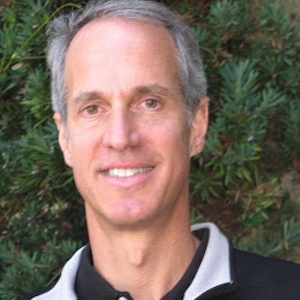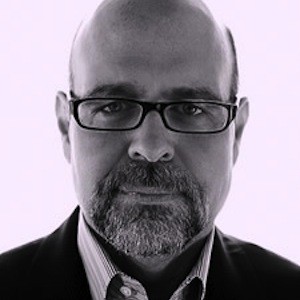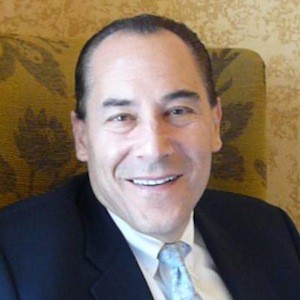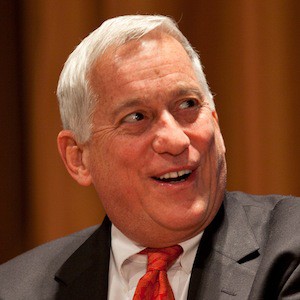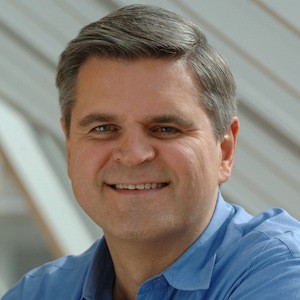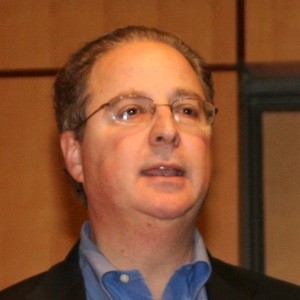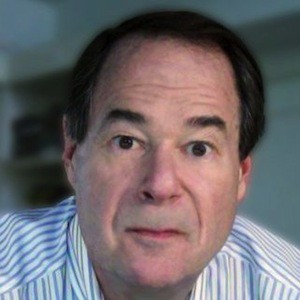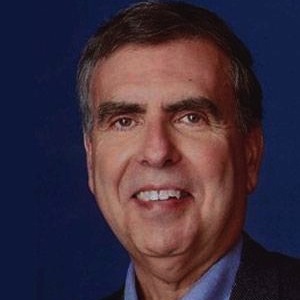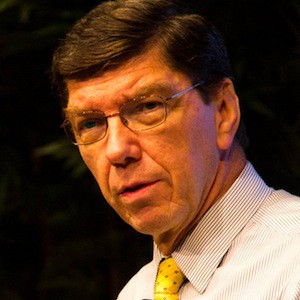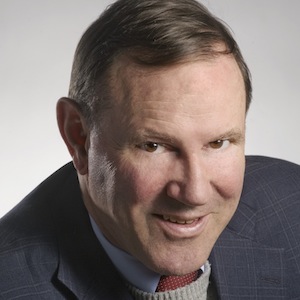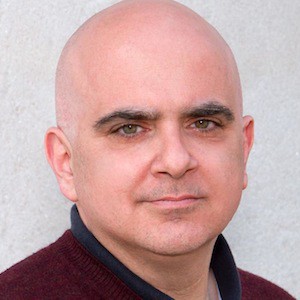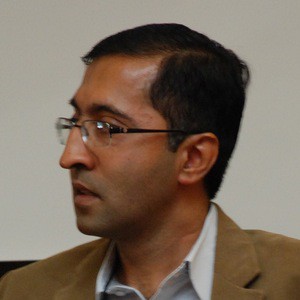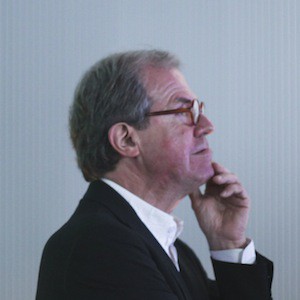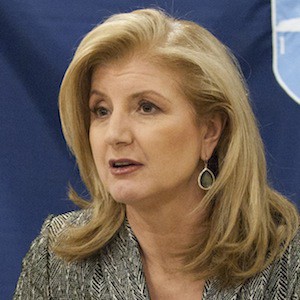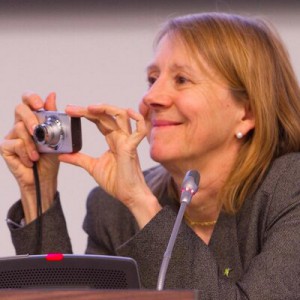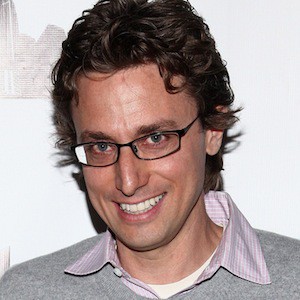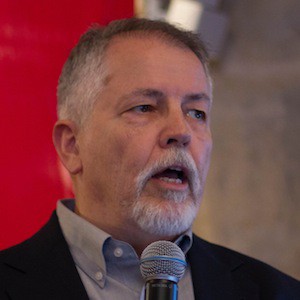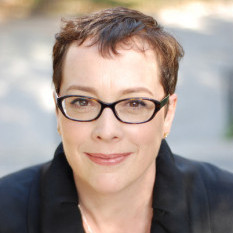Paul: It is April 9, 2013, and Paul Sagan and Martin Nisenholtz are in Los Gatos, California with Harry Motro. It’s great to see you.
Harry: It’s great to see you.
Paul: Long time. So start with just, your background wasn’t in news or media, so maybe give us the two minute resume that got you from accounting to the media business.
Harry: My love of news really originated from my father’s background. My dad was born in Palestine and grew up in Israel. As a person living in Jacksonville, Florida, he was addicted to news, because it was news of his homeland. The evening news and the newspaper were a big deal in our house. I think I just inherited a chunk of that. The other piece of my story is that my mother was a Holocaust survivor. As a Jew in Holland she sort of did the Anne Frank story and escaped. As such my parents were determined for me to be successful and have a job. My brother became an engineer, and I became an accountant.
It was really security that my parents were searching for, although it was never a great fit for me. I did it for six years, I was actually pretty good at it, but I was living in Atlanta at the time, working for Coopers & Lybrand, now Price Waterhouse Coopers. Ted Turner was getting up a head of steam. The business was growing.
My dad was an entrepreneur his whole life. He was that Israeli make it up as you go. I was attracted to Ted’s business. I came in through the accounting side, went into finance, then went to new business development.
It was great at Turner Broadcasting because Ted liked to get people who thought like he did. If you could be creative, start a new business, think outside of the box, and be aggressive, Ted loved it and you tended to do well in his organization.
I went to new business development. The first businesses that I got associated with that were connected to news were the Checkout Channel, which were TVs in grocery store checkout lines, and the Airport Channel.
Those were being done by Scott Weiss and some other people. I got associated with that, and that set me onto that path.
I’ll take a breath there. Was that the two minute background?
Paul: Yeah. That was excellent. I learned 10 things I didn’t know about you, and I have known you for 20 years.
Harry: There you go.
Paul: You were then there, CNN is really revolutionizing TV and what we now call old media TV journalism and it invented the 24 hour news channel. But it wasn’t an interactive world, and then things started to change. When did you first see the power of what digital or interactivity was going to do to news, and did you follow that immediately with this entrepreneurial instinct, or what happened?
Harry: What happened first was the impact of digital on the backend. I think it was Sony that started doing the 8 track tapes not 8 track. I don’t know, but tapes that you stuck into a big machine and you could put a little video…
Paul: It was the video jukebox.
Harry: Video jukebox. You would take little pieces, that would grab the tapes, and you could compose chosen different formats. You basically programmed it. That helped Headline News, that helped the local news feed business that Jon Petrovich did at Headline News.
Paul: It was the backbone technology of NY1.
Harry: You’re very familiar with it. That started making its way into CNN. We took that to Germany for NTV, Nachrichten Television I’m probably not saying that right at all where we did a partnership with Siemens and some other people there. I was involved in all those “new businesses,” and I saw the power to change the economics of creating 24 hour news. At the same time, a guy named Ken Tiven I don’t know if you know Ken…
Paul: Oh, yeah.
Harry: Ken was running around CNN advocating Avid, because Avid had basically digital editing, and everything else was, you know, we were running around with tapes. Those pieces started to show me, because I was working close with Ken, because Ken was supporting all the new businesses from a technical standpoint.
Paul: He had launched a news channel in Orange County, California.
Harry: That’s right. He was deeply into that. It’s funny, because I really appreciate him. He had narcolepsy. [laughs] At meetings, he’d fall asleep. But just a wonderful guy. He never really got full recognition of what he did at CNN. We saw the backend build. The frontend started happening as PCs started making penetration.
Paul: Was it the proprietary services first? Because, for a lot of publishers, print publishers, it was the dialup.
Harry: It was CompuServe for us. Our first deal was with CompuServe. They were aggressive. They were much bigger than AOL to start with. I think we initially spoke to CompuServe and Prodigy. We didn’t get to AOL till later, although I do remember meeting with Steve Case in a little conference room, half the size of this room…
Martin: What year was that?
Harry: God…I want to say ’94, ’95.
Paul: It would be about right.
Harry: Maybe it was before. It could have been a little before. It could have been ’93.
Paul: Within that period.
Harry: It was that period. It was the early ’90s, for sure. Steve was telling us how this was going to piece [?] different pitch at it, it was going to be much more creative, much more colorful, much more interesting. But we did start with the dialup services.
Paul: It was dialup, so you were repurposing or creating text or stills, with no video. It was still not a TV experience, like CNN was. Correct?
Harry: It was really tough for us, because we didn’t have content.
Martin: Right. You could do what the medium required in some ways. Because you didn’t have content, you didn’t repurpose content, which is an advantage, in some ways.
Harry: Yes, it forced us to do some work, but, on the one hand, we had the right brand, because CNN brand meant instant news.
Martin: Absolutely.
Harry: We had the right mentality of going after a new opportunity, I think. The bad news is all the text that sat inside of CNN was scripts. It was people writing stuff for someone to read over, which didn’t fit if you didn’t have a video. What we had to do is figure out how do we get rights to Reuters and AP. This is where Burt Reinhardt single handedly enabled the creation of CNN Interactive.
I think he used to work for Reuters. He knew them forever. He was a trusted figure in the industry. Reuters and AP knew that they were having someone who wouldn’t abuse their content.
CNN negotiated massive deals with Reuters for content. Otherwise, we were paying them a lot of money.
Paul: I want to make sure we get this part right, because we did talk to Scott Woelful, and he remembered Burt’s critical role in founding CNN Interactive. But one of the other things we really focused on was Reuters as primarily a wholesaler and having a different business model than AP, and kind of cracking the door open, we hadn’t realized with CNN, and with Yahoo!, and effectively putting commodity news out there in the wild for the public to get it.
Talk a little bit more. Was Reuters first at CNN ahead of AP for interactive?
Harry: Yes. Reuters was friendlier. If I get this right, AP is a consortium of all the newspapers, and they were much more resistant and restrictive.
Paul: They actually forbid them to sell for quite a while until Reuters kind of knocked the door down.
Harry: Reuters nudged them through the door. It was like, “Well, we’re going to do this.” We were much more reliant on Reuters, which is stronger internationally. That influence, I think, Scott Woelful would probably be clearer about this, but Reuters leading position influenced the actual content early on.
I didn’t realize this until I got to Infoseek, but Reuters was very aggressive in the valley at the same time I was at CNN and Paul, you were at Time.
Reuters was an early investor in Infoseek.
Paul: And Yahoo.
Harry: And Yahoo. And they had a board observer position on our board at one point. They never attended a board meeting that I remember, and they sold their position shortly after I arrived.
Paul: We talked to David Graves who was at Reuters and did the first deal with Yahoo! And then went to Yahoo! He talked about Yahoo! Would ask for a product, they would make it and then they would run around everyone else online and say, “Look what Yahoo! Has. Don’t you want to buy it, too?”
So they really played this game, particularly out here in California, very well.
Harry: They didn’t do it to us because, as part of their equity investment, if I remember right, we had a great Reuters deal.
Paul: Let’s go back to CNN then. Then we’ll get to Infoseek. You started, like many, experimenting with the dial up services and having to create a new product, which as Martin said, may have been something of an advantage because you have to figure it out. But it was still a pretty limited medium, and then the web came along.
Harry: Let me make another comment about the dial up services, Compuserve and we did AOL later, too. Early in Compuserve, the value that they wanted was on air promotion because they were trying to advertise on the cheap. We wanted to really experiment with the integration of television and online. We had people creating news, basically rewriting Reuters and AP. I can’t remember how much AP. But we also had a whole staff of people who were monitoring the forums. Do you remember that?
That was actually the more interesting part because you could see usage spikes around shows. There was a show that was done in the center of the CNN Center in the floor.
Paul: In the mall.
Harry: In the mall. I can’t remember the ladies name. She didn’t last that long.
Paul: No, but it was a live show in the afternoon. I remember.
Harry: It was a live show in the afternoon. It was sort of our feature integration show. It was actually a great learning experience. It was probably one of the most heavily integrated early shows that was done, especially around news.
Martin: I want to go back to this notion of the rationale for your developing this. The newspaper folks, Tony, others, really were focused on classified advertising and the disruptive potential of this technology.
You didn’t have…
There was no existential threat at CNN. It neither threatened the television advertising business nor, at that time in particular, the cable MSO subsidy. Why did you even…
As I recall Ted Turner didn’t even like it. Why did you even do this? It doesn’t add up to me. Was it just because you thought there was some huge business to be had?
Harry: I’m not going to take that much credit for it. It was actually the Turner entrepreneurial culture. That’s what I really think it was, that, “Hey, here’s a new business. Let’s go explore it.” It was not heavily funded. It was really self funded through the Compuserve.
Martin: Right. They paid you. That’s the key. They paid you for the content.
Harry: They paid us. So it was a financial opportunity. And the other piece where we got a bunch of money was from Lexis Nexis. Lexis Nexis, have you already heard this story?
Martin: No.
Paul: Certainly not in the context of CNN or television.
Harry: Lexis Nexis wanted to have as much researchable digital content as possible because their stuff was text, it was easy to research. They were getting a lot of money from people who subscribed to Lexis Nexis. They were getting a limited amount of our transcribed text of our shows and previously the CNN librarian had negotiated a deal with Lexis Nexis for $10,000 a year, almost no money.
I started scratching my head. Mark Bernstein and I cut this deal. This is great content and they wanted it. We flew out to California. Our content was being transcribed by a company that was using the legal touch system, where they could do it almost real time. We upped that deal with that company and sold the content to Lexis Nexis instead of like $10,000 for over a million dollars.
So we got a million from Lexis Nexis. We got more than million from Compuserve. It was enough to build the business.
Tom Johnson, he came totally from the newspaper space.
Martin: And he was running CNN.
Harry: He was running CNN at the time. Tom was not a big supporter… He supported. He was a people person so he supported me and our team, but he really didn’t understand the opportunity. It just wasn’t intuitive to him.
John Petrovich at Headline News, on the other hand, was very supported, and Bert was supportive, too.
And Ted, Ted didn’t get it either, really. I remember the first time I showed Ted a page of CNN.com.
We had started our offices under a stairwell. I don’t know if Scott Woelful told you this story. It was the most unattractive space in the entire CNN Center. It was under a stairwell. The windows were papered off because you weren’t supposed to look in. Wires in the ceiling. It was a little hell hole.
We started there, but as we gained momentum we finally moved to a marquee spot because they were starting to show it off because it started to be cool. That was the first time that I got Ted to come down and look at our web page.
I was nervous. What’s Ted going to think about it? It was just our home page and it had a pretty big graphic on it. This was on a T1 inside of CNN Center. For some reason it was slower than usual and it was a slow load and after about two seconds Ted was like just didn’t get it, big thumbs down, and walked away. I’m thinking my God, good thing he didn’t see it on dial up the way most people did.
Ted’s so used to instant gratification with three secretaries and television. He didn’t get it. I have to give Ted’s brilliance full credit. Even though he didn’t get it, his entrepreneurial gut said go do it, supported it, was interested in it. The other thing I think, Ted had a fascination with what was going on in the Valley. He closely followed the net worth of Gates and Larry Ellison. That got his attention.
Because of the humanitarian that he is, he was all over them about giving. Almost every executive meeting I was in with Ted he would digress into that topic. He knew something was going on and he knew it was important for CNN to somehow be a part of that.
Paul: Let’s make sure we tie off the CNN story. You went from these early experiments with dial up and a B2B service, LexusNexis, to a total consumer play on the web. How did that happen? At least up until the point you left CNN.
Harry: We’re sort of fast following you, Paul, at Pathfinder.
Paul: How?
Harry: You and Walter. We saw that.
Paul: We did politics together.
Harry: We did politics together after we launched cnn.com. Scott Teissler came to CNN and he brought another guy and I cannot remember his name.
Paul: Sam Gassel.
Harry: Sam Gassel, thank you.
Paul: And Monte Mullig.
Harry: And Monte Mullig.
Paul: That, I think, was very important as one of those accidents of history. Three guys who came from the Academic Computing Center at the University of Chicago.
Harry: Absolutely. I can’t remember if it was Scott or Sam who showed me for the first time what a hyperlink was. I said that’s really cool. I was in my young 30’s. I was still young enough to have enough energy and I still really hadn’t made my career so this is great, let’s go do this. We were doing the content anyway and getting paid for it by CompuServe and the other people and Lexus Nexus so let’s get some incremental revenue here.
Martin: At a certain point, because now we’re into the year of the Internet, of the web, CompuServe and AOL, AOL in particular, say we’re not going to pay you if you’ve got all your content on the web. Didn’t that happen at CNN?
Harry: We spent many hours negotiating around that. I can’t remember the details.
Martin: You managed to string it along for long enough to transition to an add model at CNN?
Harry: Yes, basically. Yeah. They were not happy. Let’s say we’ll give you some international news, we’re going to do so much here. Really, what we had to offer some was still the television promotion. We’d give them a certain amount of mentions, check it out on CompuServe. Then it was check it out on CompuServe and the web because we had a lot of leverage. This was another genius of Ted. He carved out a certain number of minutes per hour for internal promotion and we had access to that. In fact, we sold a chunk of that to AT&T when AT&T was doing an online ploy.
Martin: Interchange.
Harry: Interchange. We did a deal with them. Really infuriated Lou Dobbs because he didn’t know about it. Again, it was a self funding model. It helped us to get onto the real Internet eventually. There was a guy named Richie Glassberg who was the sales guy at CNN Turner Sales and he was the guy who liked Linda McKutchin. It was that little group of people that were inventing it.
Paul: Banner ads.
Harry: Right, banner ads.
Paul: CNN straddled both worlds, dial up and then the web and then the broadband web and it became more a graphic rich and then TV friendly media. You have to fast forward now 15 years and you can start to do TV. CNN was really suited for this.
Harry: Yeah. I remember realizing early on that of all the content, entertainment content, sports content, news content is ideally suited to be chopped up and rearranged because we figure that out when the back end got digitized. I got that and then cut it up and people like it in little chunks. We did some television pretty early on before very few people could enjoy it and what happened was we did a deal with Intel. It was called CNN at Work. Intel had so much money back then they were just throwing it around to experiment. They wanted to get video on PCs so they could sell more processors. Their idea was we’ve got dial up at home but we’ve got broadband at work and people want CNN at work.
We did a thing with Intel and that really helped us understand how to do video on the PC.
Paul: Before we move to the search part of your life, let’s talk about business models. CNN did have the beauty of the dual revenue stream. It did get subscriber money but it didn’t have to go beg for it because it was bundled and it had ads. There were revenue streams at risk. TV on the Internet today is still trying to figure out how to make that transition. You guys really had no issue with that, right? It was all new ad sales. You decided to go free. Tell us why you did that because it obviously had a lot of impact on other businesses.
Harry: Tom Johnson said, “Harry, if you give it away you’ll never be able to charge for it.” He was sort of right. Someone was going to give it away. He didn’t put his foot down enough because we were self funding. We weren’t burning up a lot of money.
Harry: Tom didn’t want to have it for free. He struggled with it. At one point, later on, we launched CNN Plus and played with what newspapers are even playing with today, segregating out a chunk of the content.
Martin: To have a premium tier, so to speak.
Harry: To have a premium tier, exactly. There were a lot of discussions on the sales side about the break up or the split between digital and television advertising dollars because you could play games with that.
Paul: If you bundled the sales.
Harry: If you bundled the sales and how that was done. It was probably the same on the magazine and the Pathfinder side.
Paul: The big risk was it would be digital would be given away for free and never even improve an ad model.
Harry: Right. Then the other side happened, too, because the online guys like Richie would try to work it the other way.
Paul: You get the TV for free.
Harry: Early on there was a lot of experimentation spending that probably you saw and that we definitely saw. Like GM. When we first met with GM they were really interested and they did a big buy that would be impossible to justify.
Paul: That’s right. There was a period where the agencies were walking down the street trying to throw money at experiments because it was the new cool but it wasn’t a sustainable model.
Harry: It wasn’t sustainable, but it was great in terms of growing a new business.
Paul: You were there and then you left. You went west. Talk about that. You went to search for, not to a portal. Talk about that.
Harry: It’s interesting. In my exit interview with Ted, Ted was asking explain this to me. What is this search? How does it really work? At the time that I left, even little InfoSeek in their news section, because they had news already but not extensive, was doing a significant amount of pages, like maybe half of CNN.
Paul: So Infoseek’s news was already half the size of CNN’s?
Harry: It was substantial. It was enough that when I said that to Ted he was like, “Whoa, seriously.”
Martin: Just for the sake of the listeners, why don’t you talk about what InfoSeek is because it no longer exists?
Paul: And the year.
Harry: The year I left was ’97. InfoSeek was one of four search engines that raced out to go public. It was really Yahoo was the clear leader, the clear brand name guy, and then there was Excite, which was KP, Lycos, which was based in Boston, and InfoSeek. InfoSeek was founded by Steve Kirsch and six other guys. InfoSeek had a good search engine and search technology that the guys developed. They had hired a guy named Robin Johnson who came from Time Inc. He built the company. It was a little over 150 people when I came. InfoSeek was under complete chaos when I got there.
Martin: What was your role?
Harry: I got hired as president. My first day I became the CEO because Steve and Robin were having a proxy battle because Steve thought Robin was the wrong guy. Robin wanted to reposition InfoSeek to a business search engine and he, not telling Steve, hired a bunch of people, bought a little company on the east coast away from Steve, and was going to do that. Steve freaked out and said I don’t want this to happen. They had been interviewing me anyway to work for Robin. The first day I got there I went to a board meeting with Robin. They excused Robin, said hey, we’re firing Robin today. Harry, go fire Robin. You’re the CEO. That was my introduction. CFO quit, head of sales quit within a week. I had to do a restart. The good news was people were flocking to the Internet at that point in time and they wanted search engines. They needed a place to find content. That’s how we got to InfoSeek.
Martin: Talk about how it developed, because they didn’t start to be content creators. I don’t think any of them did. They were organizers and guides to the web. That’s certainly where Yahoo started, but they morphed into what we call portals and content destinations. Talk about that. Then, obviously, that gave way peer search to Google in a very different model.
Harry: Yeah. Yahoo had a directory, no search. Alta Vista did Yahoo’s search I recall initially. Then it was replaced by Google. That’s how Google got their start. Info Seek was the first paid search partner for Netscape.
Martin: You paid Netscape to be…
Harry: We paid Netscape. Ned Barksdale and company were really smart, well, sort of smart and stupid at the same time. They were smart in terms of they figured out a way to monetize the traffic that was coming to their browser. They mastered it in term of…we started. That’s how we got our initial market share. Then they rotated everybody else. They basically auctioned it off at the most competitive auction possible. Our traffic was probably more dependent on Netscape than any other surf portal. One of my big mandates was to find other ways to get loyal customers outside of this expensive Netscape opportunity. The mistake that I think Netscape made is they could have started their own search engine.
They had smart technical people. They could have hired a couple of people in the search business. They could have been the Google today. But they were so focused on other opportunities more enterprise software opportunities, because I think that’s what Barksdale understood.
It was started out search, mostly for the search engine companies. The portal concept wasn’t new. Pathfinder embedded that in everybody’s mind, but it probably didn’t have the support infrastructure and…
Martin: Engineering keeps coming up as the key missing ingredient. Is that true, do you think?
Harry: I wasn’t at Pathfinder…
Martin: Whether it’s Pathfinder or CNN, one of the themes that we continue to hear over and over again is that the Valley culture really puts most of its emphasis on engineering and engineering innovation. The media culture is more defensive. They’re content guys, and that’s a huge difference.
Harry: I think that’s right. I think CNN suffered a little less from that because we had Monty, Scott, and…Help me again.
Paul: Sam.
Harry: And Sam.
Paul: It was an unusual situation that helped, but it wasn’t still at the level…
Martin: Ted Turner wasn’t.
Harry: It wasn’t the level of…
Paul: But you had a few computer scientists, which was different than all the print guys, basically.
Harry: We did. At least, on the news side, we didn’t feel like we were always a year behind. At Infoseek, the founder was Steve Kirsch. He was an MIT engineer. He had done several startups, and he had a whole cadre of engineers who followed him around company to company. He got it. We could keep up, although it still felt pretty tough.
Paul: The portal idea had started a little earlier. The search engines were basically trying to become portals, and that didn’t really work in the end.
Harry: What was interesting, we launched portals like everybody else did. I had Beth Haggerty, who came from the East Coast media world, and it was like back in CNN days of selling opportunity. I got experimentation dollars again. I got big branding dollars to go into channels. We made a lot of money, way more than probably could be justified by the actual customer interaction with the brand, by launching portals.
It was successful, we got a lot of traffic into the portals.
When I got to Infoseek, it was interesting. There was a guy, Peter, and I can’t remember his last name. He got hired away from us by Ridder Newspapers because he wanted to start doing the individual tracking and database mining around customers and around advertising, really what we see as par for the course today.
We put a technical team on it and we spent a lot of money on it. It was just too early. The technology didn’t work. We couldn’t get the payback. It was too complicated to sell. It was just a little bit early. We bailed on it. We probably shouldn’t have. It was a mistake that I made.
Paul: You then merged with content businesses, as I recall. What was that about and what happened?
Harry: Every time you ask me a question, I have to tell people stories. Here’s another one. I knew Mike Slade because…
Paul: He was ex Microsoft.
Harry: He was ex Microsoft. Because Microsoft came to CNN. I want to jump back to CNN for a second…
Paul: This is very important because it brings in the MSNBC story.
Harry: They tried to do a CNN Microsoft deal before the MSNBC deal. I don’t know who they spoke to first. They were probably negotiating both of us against each other. Nathan Mervold came. We all sat in a big conference room. A lot of meetings. They wanted half of CNN in perpetuity digitally. A lot of people talked about it and they were going to throw a lot of money at it to create it and Ted said no. At the end of the day, he was not going to give away half of CNN for any amount of money. He knew the intrinsic value of the CNN brand and so he said no.
That’s how I got exposed, extensively, to the Microsoft team.
When I got to Infoseek, Mike Slade had done a deal for Starway, which was running ESPN with Disney.
Paul: So it was a digital content company based in Seattle.
Harry: Mike Slade’s business was a digital content company that did multiple, different brands, including running ESPN with his joint venture with Disney, because Disney was trying to leverage their way into the digital space, just like TimeWarner was. Mike brokered a meeting with the three, Mike and me and Jake Weinblum. That’s how I got introduced to the Disney guys. It happened probably within a month or two of me starting at Infoseek.
Then we started having some conversations. Not much happened. But the media companies were talking to…
Martin: And Disney acquired Infoseek when? What year?
Harry: It was in two pieces. Forty three percent in 1999 and closed the deal in January 2000, something like that.
Martin: Wow, just got out in time.
Paul: When did you leave?
Harry: I left a couple of months after closing the acquisition.
Paul: That’s about the best timing we’ve stumbled upon here.
Harry: Yes.
Martin: Steve’s was pretty good, too, with TimeWarner. But you’re right.
Paul: Steve Case’s was pretty good, too. But if there was a time in the saddle versus getting out at the right time, Harry’s…
Harry: I am thankful to God that this was just the perfect timing. When you’re in a bubble, the optics are incredibly important. So a CEO selling shares in a bubble company is not a good idea. So I didn’t sell a single share until I left the company because it would be disclosable and hurt the company. I didn’t want to hurt the company.
Once I left, I started selling. Immediately I said I need to divest.
The bubble didn’t pop overnight. It was over three or four months.
Martin: It leaked first.
Harry: It leaked, so I sold during that leaking period. I was very thankful for the time.
Paul: Let’s just conclude by asking you about a couple of themes that have emerged for us. We touched on the one about the engineers and the challenge for traditional companies. Even CNN which had some true engineers by default even before you started online and Knight Ridder out here that did some early projects, but they never had many. They couldn’t hire a lot, and they would never put them in charge. That seemed to be one of the themes that just made it, in the end, impossible to compete with the tech driven companies that took over the Internet. Does that make sense to you?
Harry: I’m a little torn. There’s a guy that I hired, Miguel Garcia, who…
Paul: At CNN?
Harry: At CCN in Atlanta. He was a talented engineer. He brought in a good team. He worked with Scott and Sam and Ronnie. He built our content production system. There were smart engineers in Atlanta. I think you probably could have launched a good news company, maybe not a search engine which is even more intensive around the algorithms. I want to believe it could have been done.
Paul: But not inside CNN. Maybe in Atlanta, but not inside CNN. Or do you think there was a way to go all in?
Harry: This is the optimist in me. I think it could have been done all in in Atlanta if it weren’t for the traditionalists who were there that made it a little bit more difficult. CNN was successful when I left. I didn’t leave because cnn.com was going down. I left because Infoseek gave me a million options. It was a hard deal to turn down, A.
And B, once it got successful, it was intensely political. I spent almost half my time negotiating internally for resources or fighting power battles, be it with Lou Dobbs at CNN FM or in CNN SI/CNN Sports.
It was just too much, with everybody reaching in for a piece of this now politically attractive pie.
Paul: Our experience at Time Warner was very similar, maybe with a zero added… [laughter]
Paul: …in complexity, whereas the tech companies were new.
Harry: They didn’t have the overhead of all the people grabbing for space.
Paul: That was a big piece of it.
Harry: Yes. I think that was as big as the engineering, or maybe, my guess, bigger.
Martin: That’s why a lot of the newspapers built totally separate operations. In fact, Ridder described the process of taking his operation, although it never happened, public. They were completely trying to separate them for that reason. It just never happened for lots of reasons.
Harry: I experienced the same political dynamics with the Walt Disney company, too. I spent basically two years interacting in some capacity with Walt Disney. I had to give Michael Eisner a lot of credit, too. He got it at that point that this was really important. But that was still hard, in as big an organization as that is, to keep all the different powers out of it. Jake did a great job trying to compartmentalize things, too, but it’s just really difficult.
Paul: Let me ask you that last question, and go back to that boy you described, who was so influenced by his father. Even though you started in accounting, you loved news and you went that way. You’ve seen this arc play out, and clearly a lot of organizations, not CNN, but a lot of news organizations are in pretty deep trouble today trying to figure out how they’ll keep doing what they’re doing.
You’ve been an observer. How do you look at news now, and do you feel better served, less well served? I know you, you’re right, you are an optimist, but are you optimistic about where it’s going or pessimistic?
Harry: I’m totally optimistic. I think we always look back in history sort of with “oh, it was so great then.” I can get almost any news story I want about any content type at my fingertips at any time. I think the biggest fall back is that I read shorter stories. My attention span has shrunk probably, although I’m doing a doctoral program and read all the time and in depth stuff. I love the capacity of being able to find out what I want to know when I want to know it. I think that’s incredibly powerful. I think the digital revolution has brought that to us. I think people are story tellers, people are curious. News will always happen. People will always want to tell what’s going on with other people.
I have seen the pain of a lot of journalists being laid off in the newspapers and transitions are always very difficult for certain people at certain places, and my heart goes out to them. I don’t know how to stop or change that. I tell me kids, “Get on the new thing, not the old thing.” [laughs]
